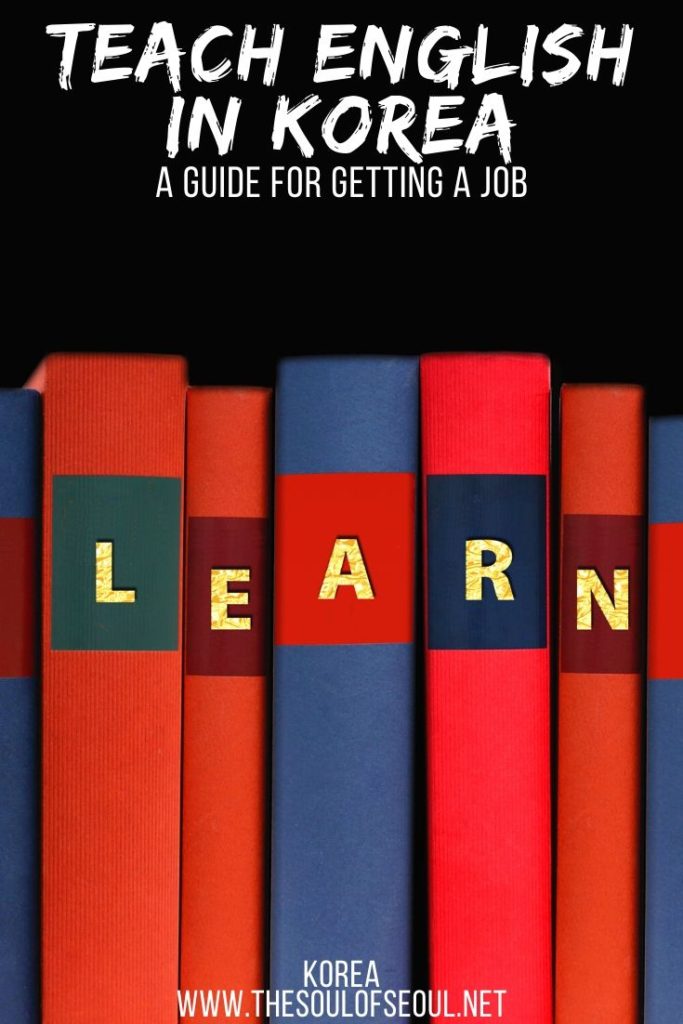Teach English In Korea: A Guide For Getting A Job
South Korea is one of the top places in Asia to teach English and there are ample reasons from a higher salary to perks and benefits that make it so. The popularity of teaching English can probably also be attributed to the rise of Hallyu, K-dramas, and K-pop, but whatever is drawing you to the Land Of The Morning Calm, you need to know how to get a job teaching English in Korea and the requirements too so let’s get started.
Do you want to teach English in Seoul? Teach English in Busan? Or maybe go to the Hawai’i of Korea and teach English in Jeju? Here is a guide to help you get started whether you’re trying to decide whether to choose between a private academy (hagwon) or public school or need to know the documents to get a visa. Here’s everything you need to know to get you from A to Z… or from wherever you are to Korea.

Here’s what you’ll find in this post. Feel free to skip around:
- Why You Should Choose To Teach In South Korea
- The Benefits Of Teaching In Korea
- Where To Find Job Listings
- Starting The Process
- The Interview Process
- Visa Approval
- Time To Travel To Korea
(This post contains affiliate links, which means I receive a certain percentage of a sale if you purchase after clicking at no cost to you. Thank you for your support.)
Why You Should Choose To Teach In South Korea
Money Savings: There are numerous reasons you should choose to teach English in Korea but the top reason for most people here is to save money or pay off debt. Because schools foot the bill for airfare and housing, you can save upwards of $1000 a month if you really put your mind to it and especially if you choose a job outside of Seoul.
Ease To Get A Visa: When I began my search, I did it on my own. I was bouncing back and forth between countries in Latin America or Spain. It made more sense for me because I studied Spanish in college. The number one problem I ran into when I tried to get a job in Europe was the visa situation. Some schools and language centers don’t want to sponsor Americans because it’s really expensive. Without their sponsorship, it’s very difficult to get proper documentation to work there. This is not to say that working in Europe is impossible, it’s just a lot more difficult. Long story short, I scrapped that idea, at least for now. Getting a visa is much easier in Korea if you’ll be teaching English.
Comforts: Though Korea is very different culturally from where you’re likely coming from, it does offer a lot of those creature comforts especially if you’re American. Since the American military has been here since the 1950s, there is plenty to choose from in terms of western food and some of those simple necessities. Wondering what you NEED TO BRING though? Check out the post “10 Things To Know Upon Arrival In Korea” at the end is a packing list if you’ll be moving here with things that are still a bit rough to find.
The Benefits Of Teaching in Korea
In comparison to Latin America and Europe, Asia has the highest pay in the TEFL market. Native English teachers are in such high demand here because students need to learn English to get into a top university, study abroad, or work for international companies. The countries that offer the highest salaries are Japan, South Korea, and China. Days of careful research led me to lean towards South Korea because they pay so much even if you have no experience with teaching or working with kids.

There are two options when it comes to teaching in South Korea, public school or hagwon;
EPIK
For public school, you’d be hired through EPIK which stands for English Program in Korea, a program sponsored by the Korean Ministry of Education. The EPIK program was established in 1995 with the mandate to improve the English speaking abilities of students and teachers in Korea and to develop cultural exchanges.
Through the EPIK Program, over 1,000 teachers are placed in ESL teaching jobs every year. The contract lasts 1 year, housing is paid for, you work 20 hours a week, lots of vacation time, and typical class size is 30 students.
Private Academy/Hagwon
The route that I went was more difficult because I was virtually on my own. South Korea has recruiting agencies all over the country to place foreign teachers in something called a hagwon. This private academy is an after-school program that students attend for extra English practice. Private academies are run under a ton of different names depending on the owner or if it’s a branch of a major company.
The hours completely vary depending on the business. Some hagwons are for kindergarten, so they run from 9-5. Whereas others cater to elementary-high school students and open 2-10. Working at a hagwon is vastly different from public school. As a foreign teacher you are on your own in a class size maximum of 8 students, the workload is typically more than public school, the salary is higher, but less vacation time.
Private School (Hagwon) Vs. Public School
There are pros and cons for both options and it’s important to know what they are before you jump into getting a job. Most Korean students will attend public school during the day and then attend private academies in the afternoon and through the evening.
Pros Of Teaching At Private Schools/ Hagwons
- Hiring is year round so you can get a job throughout the year.
- Allows you to pick the area you want to live in and find a school in that area.
- Potential for higher salary
- Classes are generally based on level of language as opposed to age
- Smaller class sizes
- More than one foreign teacher in the school
- Better chance of being hired because there are far more hagwons compared to public school jobs.
Cons Of Teaching At Private Schools/ Hagwons
- Hagwons are privately owned which means if you have an issue with your boss, there’s nowhere to complain. Hagwons can really be hit or miss so it’s important to get as much info as you can prior to taking the job.
- More teaching hours per day.
- Later working hours (For me this is a con because I’m a morning person, but this could be a pro for you if you’re not a morning person. Hagwons usually start from 1:00pm and end around 8:00pm or 9:00pm.)
- Fewer holidays and vacation time
- Teaching along without a Korean coteacher (Again, this might be considered a pro for you if you would rather have more control in your classroom.)
- Management generally considers the business perspective over the educational value because hagwons are a business.
Pros Of Teaching At Public Schools In Korea
- More paid vacation and holidays
- More stable position because the contract is with the government as opposed to a private owner.
- If there is an issue with a principal/co-teacher, etc. you can talk with your MOE handler who is outside of the school and can help.
- Korean co-teachers are required to be in the classroom so they can help with classroom management and translation if necessary.
- Less teaching hours per day so there is more prep time per day.
Cons Of Teaching At Public Schools In Korea
- Only hires twice a year so if you just missed the window, you will have to wait 6 months to apply.
- Larger class sizes.
- Text books are chosen by the government which means they’re generally lower level than the students’ level and boring compared to what they’re getting at their private hagwons.
- Some co-teachers don’t want to teach with the foreign teacher or take over the class so you have less control. Remember that the requirements for teaching jobs here is pretty slim so many of the co-teachers have had bad experiences with unprepared foreigners that just want to travel and don’t care about teaching.
- Generally only elementary public school positions are available so teaching middle school or high school isn’t available.
- Getting a public school job in Seoul is difficult unless you already have experience but there are plenty of jobs in the suburbs of the capital and the countryside of Korea.
If you want to delve in a bit deeper and really see the differences between hagwons and public schools and see what the pros and cons, check out this guide to public schools and hagwons to help make the big choice.
Where To Find Job Listings
To find a teaching job in Korea, you can search various sites on your own or go through a recruiter. Do note that most of the jobs listed on sites are actually through a recruiter so whether you start with the recruiter or not, you’ll likely end up using one to get a job in South Korea.
Since I got my TEFL with The International TEFL Academy and they offer job search guidance as well as advisors who assist you around the clock, I used their service when searching. Other TEFL programs like the online courses offered by International TEFL and TESOL Training (ittt) also offer this kind of assistance so look into their services before applying on your own.
At the time when I was searching for a job I was on a bit of a time crunch. I did use the resource guide offered by the academy, but I also took it into my own hands. Here are some suggestions for sites to use if you’re searching for a teaching job in Korea on your own.

Websites To Search For Jobs In Korea
Before applying for positions on these job boards, I suggest that you redo your resume to fit an international standard. The requirements for what needs to be included in America vs. the rest of the world is slightly different. You need to make sure that your resume has the format and information required for the country of your choosing. For example, in Asia, you need to have things like age and a headshot of yourself. The headshot was definitely weird for me at first because in America that’s isn’t a thing.
Yes, in Korea you need to include a photo on your resume. The process to get a job here is not for everyone and there is discrimination in the system which is important to know. The first thing prospective employers will look at is your photo. It’s obviously something that needs to be changed, but that is what is currently happening and it may give some insight into why Seoul is so popular for medical surgeries and medical tourism. In order to get the top jobs, everyone either Korean or foreigner, needs to look a certain way. On that note though, if you’ve lived here for some time, you’ll actually notice that Koreans even edit their passport photos so the photos on resumes are really their best selves.
Once my resume was fixed I applied to around 10 schools a day. I kept running into dead ends and I got so frustrated because no one would get back to me. On Dave’s ESL Cafe, there’s this page where you can post your resume and employers can find you. I was so desperate at this point that I just put it up there. The next morning, I woke up with about 15 emails from different schools, mainly in China, Taiwan, Hong Kong, Vietnam, Japan, and South Korea.
Starting The Process
Requirements To Teach In Korea
- A valid passport from one of seven countries including: US, Canada, UK, Ireland, South Africa, Australia, or New Zealand
- A bachelor’s degree from an accredited institution in any subject (You do not have to have an English degree or related to teach English in Korea.)
- A background check with a clean record (Traffic violations aside, you’ll be hard pressed to get a job in Korea if you have any charges or convictions against you.)
- A clean health check
NOTE: These are the minimum requirements per the Korean immigration authorities however, your employer may have other requirements. For example, to teach with the Korean public school system, you need to have a TEFL certification. Not only is it extremely useful for anyone looking to teach ESL, but it’s also required by more and more institutions here. You can get a certificate online easily with ITTT (<– You can get a 10% discount if you click that link). I used this option since I was already living and working in Korea but wanted to make the switch from hagwon to public school.
I had a couple recruiters contact me via email from agencies all over South Korea. I was skeptical at first, but gave one of them a chance, and we scheduled a phone interview. I spent an hour on the phone talking to the recruiter where he basically sold the idea of living in South Korea to me. He asked me where I saw myself living, my salary expectations, and what kind of working environment I best fit into. As far as I know, that’s the first step of the process with most agencies. Once you have your bases covered with the recruiting agency, it’s time to send them your newly updated resume and a couple of head shots.
After sending in your resume, the agency will reach out to you with a list of prospective schools that are hiring. They will include information like the salary (2.1-2.3 million KRW), benefits, the targeted age group, and the location. Every hagwon offers the same benefits because they legally have to. I was focused on what age group I’d be working with, and where I’d be living.
Every school my recruiter sent me, I would do my research about the school and location to see if I liked the area. After that, I’d give them the thumbs up to send my resume out. Interviews were usually scheduled within 3 or 4 days after my resume was sent. Before my interviews, my recruiter was very helpful in the way that he’d give me pointers and other advice to be successful and impress the school.
The Interview Process
If it’s your first time to get a job in Korea, you’ll likely still be at home and not in Korea so the interview will be held via Skype or landline. You should be prepared for a couple rounds of interviews and remember that if you’re speaking with Korean staff over the phone, you’ll want to speak clearly and a bit slowly to ensure you’re understood. Generally, schools prefer the North American accent because they’re easier to understand for Koreans that have more experience with Americans since the Korean War so if you have an accent, just speak as clearly and enunciate as much as you can.

The interview is pretty straight forward with hagwons. You don’t need relevant experience to get the job. However, I will say if you do have experience working with kids in any capacity, that can give you a leg up.
They may ask you things including:
- to introduce yourself so be sure to include your name, age, nationality, and academic background
- why you want to teach in South Korea
- how you will deal with behavioral issues
- your class management techniques
- to describe your teaching style
- why you’re passionate about teaching English
- what other languages can you speak etc.
- why you would be a good teacher
- how you would deal with classes that have students of varying levels
- what you know about Korean culture
- whether you’ve been to Korea before
- what types of students you’d prefer to teach
- how you would encourage shy students to participate
When interviewing with these places, you simply just have to show that you’re open minded and ready to learn.
Remember that you are interviewing them at the same time that they are interviewing you. Often the interview is done over the phone since you’re abroad which means you can’t see the school or meet the teachers that currently work there. ASK to be connected with current foreign staff. If the school is a good one with nothing to hide, they will gladly connect you to a current teacher or maybe the teacher that you’ll be replacing. That teacher will give you the in’s and out’s of everything you need to know about working there, living in your area, and how to get around. Please ask all the questions you can to this person. They can fill you in on the school and management so you can decide if it’s the right fit for you.
Visa Approval
After you do your interview, the school will contact you within a week to let you know if you got the job. As soon as that information is relayed between you and your recruiter, the ball starts rolling. The agency will send you a checklist to start the process of applying for an E2 teaching visa (valid for 1 year), which takes about a month to get.
Before you can even send in an application for the visa you have to apply for a national-level FBI background check and get your college diploma notarized (basically confirming that it’s not fake). Then you can finally send in all your paperwork and wait for the results.
What paperwork is required to get a teaching visa in Korea?
- A copy of your diploma/degree. If you are a non-Canadian or non-US citizen, you will have to get your diploma/degree apostilled. Canadian and US applicants will have to get their degree/diploma certified through a notary public.
- Sealed university/college transcript. (Please, don’t try to use unofficial copies you printed out at home!)
- Passport photos.
- Your original passport.
- Copy of your employment contract, which will be supplied by the school or recruiter.
- National level criminal background check. In Canada, this is obtained through the RCMP, while in the US it is through the FBI. Non-Canadians will need to have their background checks apostilled. Canadians need their background checks certified through a notary public.
This part of the process was probably the most nerve wracking because getting a visa for another country is tricky business. The only problem I ran into was that the Korean embassy didn’t like the photos I sent (they’re supposed to be passport-style). Therefore that delayed me 3 or 4 days which isn’t a good look for the school that hires you or the recruiting agency.
The whole visa process is a giant waiting game, until you get word that it’s finally approved! Hallelujah! Now, you send your physical passport to the Korean consulate nearest you where they’ll put the visa inside your passport. I will put a disclaimer here and tell you that you are responsible for covering the costs of this process. Getting your FBI background check is $50. Getting your college diploma and background check notarized is $55 per document. You can use services like Fedex to send documents so that you can track the entire away and know where your documents are. Of course no one wants to lose their passport. I found this family-owned company called Monument Visa and used their services.
Time To Travel To Korea
This hardest part is finally over, now you can take a long sigh of relief. Next up is the most exciting and terrifying part, relocating abroad.
Buy A Plane Ticket
Most hagwons will pay for your flight from your home airport to Seoul, but some don’t and they have their reasons. The private schools will often ask to see your plane ticket receipt if they’re reimbursing you or they’ll buy the ticket for you. Public schools, on the other hand, will require the teacher to purchase their ticket and then they will reimburse you after you’ve arrived. Public schools will give you 1.3 million won.
Are you savvy? I definitely am. You can get some great deals on flights to Seoul, Korea on various sites but I’ve always found the best deals on Skyscanner.com. Now, note, the public school isn’t reimbursing you for the exact amount you pay for your ticket which means if you can find a ticket that costs less, you can actually make a little money on this deal. At the same time, if you choose to fly first class and spend way more than that, they won’t foot that bill. Everyone gets 1.3 million won, done.
Get Good Hard Case Luggage
Packing all of the essentials is good only if they get to the other side with you. Make sure to have good luggage to get you and your belongings all the way. Roam Luggage has awesome customizable bags that will go the distance and look super cool on the way.
Accommodation
It’s important to know what to expect when you first arrive in Korea. From the cultural differences to housing differences too. Did you know that in Korea, there is only floor heating in homes and no central heating system? It’s a small difference with a big impact honestly.
Generally schools provide housing to incoming teachers. There are a couple things you need to understand about this though. Housing in Korea, especially in Seoul is extremely expensive and this is one reason schools almost NEED TO provide housing.
The system to get a home in Korea is entirely different from other countries in that it requires a renter (not just an owner) to put down a massive amount of money generally starting at $10,000 but can go up to $500,000 just to RENT an apartment. On top of that, you’re still paying rent each month. Most recent graduates obviously wouldn’t be able to afford this and so schools put down the money and pay the rent for you which means you have FREE housing while you’re here. That can be a blessing and a curse though.
If you get to your school and a few months in realize the school isn’t the right fit for you, you can’t just leave the job because in effect you’ll also become homeless. Again, this is why it’s super important that you ask all of the questions about the school during your interview to understand what you’re jumping into.
Some schools, in lieu of providing housing, will give you a housing allowance which you can use to find your own home. They don’t give as much as they’d put down for a place under their name though.
When you first arrive and are taken to your apartment, ensure that everything you agreed to is there. Schools will often include this in the contract and will state that the apartment is furnished with one bed, one desk, one shelf, etc. Make sure it’s all there and in working order. If it’s not, talk about it ASAP.
Housing really varies across the city and out into the suburbs. If you’re living in central Seoul expect to have a much smaller apartment than those teachers that opted for a job in the suburbs or in the countryside. Having a larger home is a perk to choosing suburban life in Seoul. PS, the subway system is massive here so you’ll have no problem getting in to central Seoul from any suburb of the city so don’t let that be a hindrance.
Time To Study Korean
While you don’t necessarily NEED to study Korean, you will find your time here immensely better if you can speak at least some. From ordering food in the restaurant to wanting to get a certain style of clothing or just talking with the street vendors, a little goes a long way. 90 Day Languages has a great course on Korean and offers a lot of help if you’re interested in preparing before you come and while you’re here. Also check out Optilingo which has a number of great posts and resources for learning Korean. A little goes a long way here.
There are so many new experiences you’re bound to have when you come to Korea like going to a Korean wedding, so know what gifts are appropriate, and traveling to see more of the country. Be prepared to smile and learn and be inspired by the experience.
Get Ready To Send Money Overseas
So you’re saving the big bucks and paying off student loans… or just piling on your savings. Make sure you know how to do that. There are various overseas remittance options but my go-to is SentBe, which is trusted, safe, reliable, and fast… oh and it’s the cheapest too.
Did you like this post? Pin It!





5 Comments
Majid
Hi there
Is it possible teaching for another countries like, Turkey and Iran in south Korea? by the way I have TEFL degree with 10years experience in teaching English.
Hallie Bradley
It’s not possible if you’re passport is from any country other than the ones approved to teach English. You could teach something else though, but it wouldn’t be English.
Ian
I taught in both public schools and hagwons in Korea. In a public school I had issues with my co-teacher and no one was on my side. There was no one to talk to. My co-teacher was the only person.
I had already been teaching for like 3 years by the time I did public school which is easier really because you don’t have to do that much since you’re an assistant. You have more autonomy usually in a hagwon which I prefer.
Despite what some people say I think you are more of a teacher in a hagwon than you are in a public school.
You just got to do your research.
GARY SIM
Potential
Joey Seo
Great article~ Thanks~!!